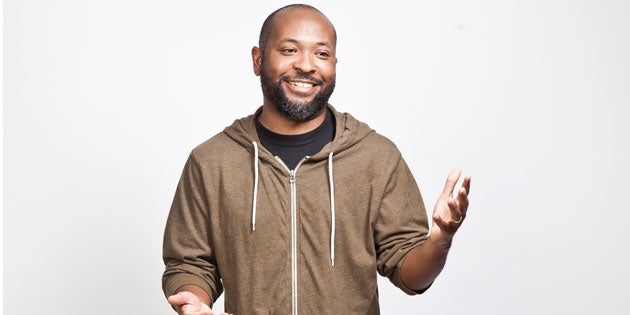Since coming to the College in 2013, Gary Jackson, assistant professor of English, has been opening students’ minds to the possibilities of rhyme and meter to express the complexities of the human experience.
Jackson, who’s been recognized as a “New American Poet” by the Poetry Society of America, recently sat down with College of Charleston Magazine to talk about his love of verse and his passion for comic books.
Q: How did the Midwest shape your writer’s voice?
A: Topeka, Kan., is home, and home is always going to influence you, as cliché as that is. I’d like to think my voice is relatively consistent: The way I talk bleeds into the way I write. There are poems out there that sound like the way I’d talk to my mom, or better yet – sound like the way she’d talk to me (I’d get bored pretty fast if I were only limited to one voice), but that chorus originates from the way I was raised, the folks who taught me how to write and how to speak. That’s Kansas. I’ve been saying y’all long before I moved here.
Q: Why should we study poetry?
A: It’s funny to me, but I’m pretty sure students encounter poetry/poets constantly while they’re in primary school. I did. And most of my peers did as well. Teachers introduce students to Homer, Shakespeare, Dickinson, Whitman, Wordsworth, Brooks, Frost, and then something happens: We stop exposing ourselves to poets. Most of us continue to read and experience short stories, novels, comics and plays, but poetry becomes this bastard of literature: this thing we read up until our senior year of high school, and for some reason we never think to revisit for pleasure, to ever read a poem published after 1945.
And then students crack open a book of poems by Natalie Diaz, Terrance Hayes, Matthew Dickman, Matthea Harvey or whomever, and they’re like, Whoa. This is poetry, too? You can write poems about this? I never knew.
Poems may be a certain kind of creature, but they can be stories, too, just a different kind of story. And who doesn’t love good stories?
Q: What poet most influenced you as a teenager?
A: Langston Hughes and Sylvia Plath were the first poets I really read in high school. And they were the first two poets I was really trying to pay attention to how they wrote. But I was a teenager, so most of that went out the window as soon as I got out of class and got down to the business of being a stupid teenager doing wonderfully stupid things.
Read more about Jackson’s selection as a “New American Poet.”
Q: With which comic book hero do you most identify?
A: Once upon a time, I would have said Spider-Man because he was always portrayed as this type of everyman loser: the guy who was trying to pay the rent though it’s past due, pass his final exam and have a decent social life – and everything would have worked out perfectly if it wasn’t for the Sandman and Doc Ock always blowing through town. Though when you go back and read old Spidey issues, you realize he never really had it that bad. There’s this great panel or two, back when Peter Parker was still kind of flirting with two women, and these two guys notice. One says something along the lines of “That Peter Parker ain’t special!” And the other says, “Yeah! Take away his good looks and his sharp brain, and he’s got nothing!” I’m sure I’m misquoting the entire conversation, but that was the effect, and I thought to myself, This is the guy who’s supposed to be a born loser?
The X-Men, as a whole, work better for me, since they’re constantly othered. I can relate to that, which is kind of the point behind the X-Men. Anytime someone remarks on wanting to touch Storm’s hair or Nightcrawler’s fur to know how it feels, or if it’s real, I have flashbacks to specific moments in my own life.
Q: What would your superpower be?
A: Multiple Man, no question. I won’t get into how his powers work. But aside from having to create kinetic energy to make a duplicate of myself, I would take his power set in a second.





